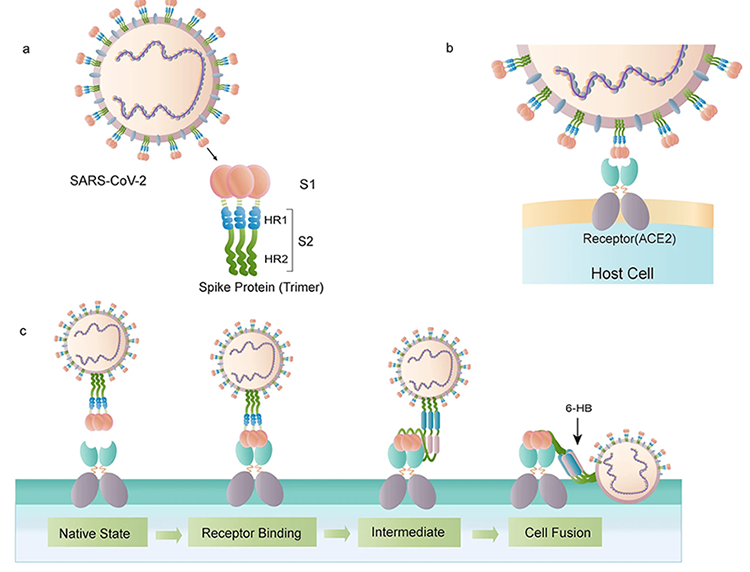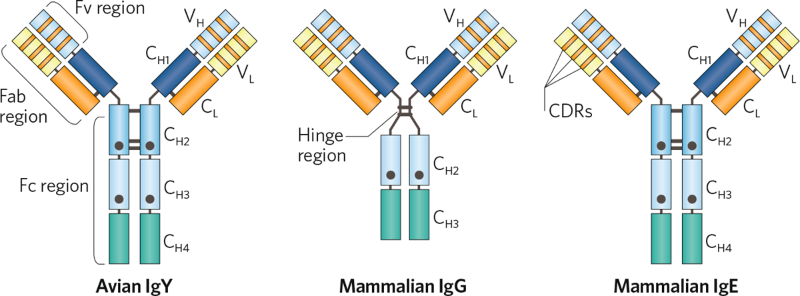| Drug Name | IGY-110 |
| Description |
Immunoglobulin Y (IgY) is a type of immunoglobulin found in birds and could be isolated from egg-yolk of chicken eggs. IgY is generally regarded as safe and offers various advantages in comparison to mammalian antibodies. IgY antibodies created to target specific antigens are intended to have a localized, highly target-specific, predictable, and efficient antigen-antibody interaction. IGY-110 is an IgY antibody that targets the spike proteins of the coronavirus, especially suitable for those most vulnerable from the infection (elderly and immunocompromised). IGY110 will be administered as a nasal spray. This novel approach allows the delivery of the antibodies directly to the nasal cavity, a key site of coronavirus entry and infection. IGY-110 is currently in preclinical trials and will begin clinical trials by early 2021. |
| Target | Spike proteins |
| Drug Modality | IgY Antibody |
| Indication | Covid-19 |
| Product Category | Immunotherapy |
| Mechanism of Action | Inducing protective immunity against viral infection and viral spread |
| Status | Preclinical |
| Patent | Granted |
Protheragen Inc. is actively seeking partnership for IGY-110. Potential collaboration can be strategic alliance, licensing, or marketing agreement.
We look forward to hearing from you.
The Covid-19 is caused by a coronavirus later named severe acute respiratory syndrome coronavirus 2 (SARS-CoV-2), which is a single-stranded RNA-enveloped virus. Its entire genome is 29,881 bp in length, encoding 9,860 amino acids. Gene fragments express structural and nonstructural proteins. The S, E, M, and N genes encode structural proteins, whereas nonstructural proteins are encoded by the ORF region.
The total length of SARS-CoV-2 Spike (S) Protein is 1273 aa and consists of a signal peptide located at the N-terminus, the S1 subunit, and the S2 subunit. The S1 subunit contains a receptor-binding domain that recognizes and binds to the host receptor angiotensin-converting enzyme 2, while the S2 subunit mediates viral cell membrane fusion by forming a six-helical bundle via the two-heptad repeat domain. Once the virus enters the cell, the viral RNA is released, polyproteins are translated from the RNA genome, and replication and transcription of the viral RNA genome occur via protein cleavage and assembly of the replicase–transcriptase complex. Viral RNA is replicated, and structural proteins are synthesized, assembled, and packaged in the host cell, after which viral particles are released. The spike proteins are coated with polysaccharide molecules as camouflage, evading surveillance of the host immune system during the entry.
The SARS-CoV-2 S protein is highly conserved among all human coronaviruses and is involved in receptor recognition, viral attachment, and entry into host cells. Due to its indispensable functions, it represents one of the most important targets for Covid-19 vaccine and therapeutic research.

From Acta Pharmacologica Sinica volume 41, pages1141–1149(2020)
Immunoglobulin Y (IgY) is the most common type of immunoglobulin produced in birds, reptiles and amphibians. Its wide range has been effectively confirmed in both human and animal health. Similarly, to human IgG, IgY is produced at high concentrations in serum, accumulating to high concentrations in egg yolk, making it possible to extract large quantities of highly purified antibodies from chicken eggs.
IgY has an equivalent functional role to both mammalian IgG and IgE, but several characteristics make IgY well suited for human use:
● IgY does not induce specific resistance because it targets multiple antigens;
● IgY has greater binding avidity to target antigens than mammalian IgG;
● IgY directed against conserved mammalian proteins is easier to produce than IgG because of the evolutionary distance between mammals and birds;
● IgY does not bind to mammalian Fc receptors or induce an IgE response, minimizing the risk of allergic reactions and administration-related inflammation.

Image source: https://www.nature.com/articles/d43747-020-01049-5
SARS-CoV-2 was characterized as a beta-coronavirus and recognized as the seventh discrete coronavirus species capable of causing human disease. The disease caused by the virus was officially named coronavirus disease 2019 (Covid-19) by WHO.
Person-to-person transmission of SARS-CoV-2 is primarily via inhalation of suspended respiratory droplets, i.e., secretions (> 5 mcm) generated when an infected individual coughs, sneezes or speaks, or through direct contact with an infected patient. The incubation period ranges from 2-14 days, after which Covid-19 disease manifestation varies widely, from an asymptomatic carrier state to pneumonia or acute respiratory distress syndrome (ARDS).
According to WHO, as of October 4, 2020, more than 34.8 million laboratory-confirmed cases of Covid-19 had been diagnosed and reported worldwide. Also, as of this date, WHO had confirmed more than one million deaths from Covid-19 worldwide.
As the number of people affected by the Covid-19 outbreak steadily multiplied and with a lack of virus-specific therapies, various host-directed therapies are investigated to treat the most seriously ill patients, such as nutritional interventions, immunoenhancing agents, and convalescent plasma.
The spike protein is the main antigen component in all structural proteins of SARS-CoV-2. Unlike other functional proteins of SAS-CoV-2, it is responsible for inducing the host immune response. IGY-110 is an IgY antibody that targets the spike proteins of SARS-CoV-2 to induce protective immunity against viral infection. IGY-110 as a neutralizing antibody could be used to reduce the course of infection or in the setting of prevention.
IGY-110 will be administered as a nasal spray for vulnerable populations, the elderly and the immunocompromised, who are at the highest risk from Covid-19. The intranasal route of administration will deliver the antibodies directly to a key site of coronavirus entry and infection.
IGY-110 is currently in preclinical trials and will begin clinical trials by early 2021.
● Testing the titers of the 2nd generation of IgY antibodies in chicken.
● Designing IGY-110 as a nasal spray.
● Phase I clinical design approved by the IRB.
